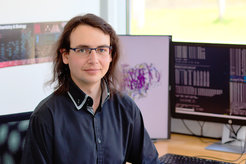„Resilience in stressful circumstances is a useful skill”
Meet our former IMPRS-APS student Sebastian Reiter, who just recently defended his thesis in February!

Are all IMPRS-APS students physicists? Definitely not! Take Sebastian Reiter, for example: Sebastian studied chemistry at LMU Munich and completed his Master’s degree in 2017. He specialized in theoretical chemistry and started his PhD in 2018 in the group of Prof. Regina de Vivie-Riedle at LMU Munich, from where he graduated in 2025. His PhD focused on interactions of molecules with their environment and the ensuing effects on the excited state dynamics. He was a member of IMPRS-APS throughout his PhD and from 2020 to 2021 he was student representative.
What kind of research did you do in your PhD thesis?
I performed multiscale classical and quantum mechanical calculations to study the effects of interactions between molecules on exited state processes. Such effects play an important role in everyday phenomena, a prime example being photosynthesis, where the local protein environment of each chlorophyll pigment induces subtle changes in the excited state landscape and thus guides the energy and electron transfer in the light-harvesting process. Another example is assembly-controlled photocatalysis, where dispersive interactions between catalyst and substrate can facilitate chemical reactions despite short excited state-lifetimes of the catalyst. Quantum chemical calculations allow us to follow reaction mechanisms and unravel the excited state processes after photoexcitation.
How did you become interested in this field?
I was fascinated by the possibility to follow chemical reactions at an atomistic level through molecular simulation, complementary to ultrafast spectroscopy methods. The bottom-up approach of modeling a molecular process in its simplest form and then adding more and more complexity until you can reproduce and thereby explain an experimental signal has interested me ever since my undergraduate studies and so I chose this field for my PhD.
What would you say was the most rewarding moment of your PhD journey?
There were many rewarding moments along the way, certainly anytime a paper was accepted. But also before thinking about a paper, it was always very rewarding when it became apparent that a model I had worked on, sometimes for several months, was able to reproduce experimental data almost perfectly, thus validating a chosen approach and enabling a deeper analysis.
Were there any challenges along the way?
Not every project went as smoothly as I had hoped, but in the end it always worked out and I had gained a lot of experience in the process.
How did you become part of the IMPRS-APS?
My PhD supervisor made me aware of the IMPRS-APS, so I applied for the selection round, where I gave a talk about my Master’s thesis and my PhD research ideas and got accepted.
How did you benefit from the IMPRS-APS? Or what impact did the IMPRS-APS have on you?
The IMPRS-APS has funded parts of my PhD, for which I am very grateful, and has given me many opportunities to expand my horizon. I particularly enjoyed the possibility to participate in many lectures, seminars and workshops during my PhD as well as the option to contribute own ideas to the program as a PhD student. Moreover, the IMPRS-APS has enabled me to visit several conferences over the years and connect with other scientists, which has benefited my own research very much. Of course, through the IMPRS-APS I also got to know many like-minded colleagues, who were pursuing their PhD in related fields.
What skills or experiences gained during your PhD do you think will be most valuable in your future career?
Apart from purely technical expertise, I think resilience in stressful circumstances is a useful skill you pick up during a PhD. Another aspect is that a large part of my research was embedded in diverse and interdisciplinary teams with researchers from chemistry, spectroscopy and biology. This has repeatedly required me to look beyond my own specialized field of research and think from the point of view of my colleagues, which is certainly helpful in many situations.
What are your plans for the future?
I am currently looking for postdoctoral positions.
